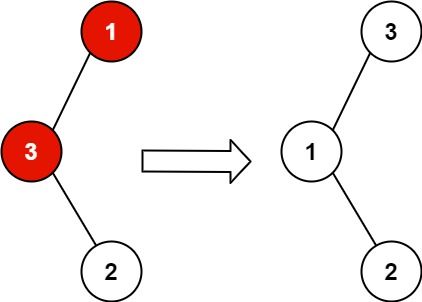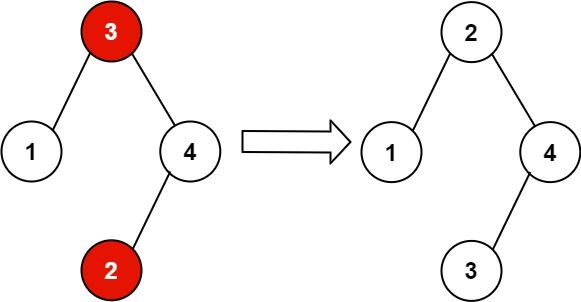| comments | difficulty | edit_url | tags | ||||
|---|---|---|---|---|---|---|---|
true |
中等 |
|
给你二叉搜索树的根节点 root ,该树中的 恰好 两个节点的值被错误地交换。请在不改变其结构的情况下,恢复这棵树 。
示例 1:
输入:root = [1,3,null,null,2] 输出:[3,1,null,null,2] 解释:3 不能是 1 的左孩子,因为 3 > 1 。交换 1 和 3 使二叉搜索树有效。
示例 2:
输入:root = [3,1,4,null,null,2] 输出:[2,1,4,null,null,3] 解释:2 不能在 3 的右子树中,因为 2 < 3 。交换 2 和 3 使二叉搜索树有效。
提示:
- 树上节点的数目在范围
[2, 1000]内 -231 <= Node.val <= 231 - 1
进阶:使用 O(n) 空间复杂度的解法很容易实现。你能想出一个只使用 O(1) 空间的解决方案吗?
中序遍历二叉搜索树,得到的序列是递增的。如果有两个节点的值被错误地交换,那么中序遍历得到的序列中,一定会出现两个逆序对。我们用 first 和 second 分别记录这两个逆序对中较小值和较大值的节点,最后交换这两个节点的值即可。
时间复杂度
# Definition for a binary tree node.
# class TreeNode:
# def __init__(self, val=0, left=None, right=None):
# self.val = val
# self.left = left
# self.right = right
class Solution:
def recoverTree(self, root: Optional[TreeNode]) -> None:
"""
Do not return anything, modify root in-place instead.
"""
def dfs(root):
if root is None:
return
nonlocal prev, first, second
dfs(root.left)
if prev and prev.val > root.val:
if first is None:
first = prev
second = root
prev = root
dfs(root.right)
prev = first = second = None
dfs(root)
first.val, second.val = second.val, first.val/**
* Definition for a binary tree node.
* public class TreeNode {
* int val;
* TreeNode left;
* TreeNode right;
* TreeNode() {}
* TreeNode(int val) { this.val = val; }
* TreeNode(int val, TreeNode left, TreeNode right) {
* this.val = val;
* this.left = left;
* this.right = right;
* }
* }
*/
class Solution {
private TreeNode prev;
private TreeNode first;
private TreeNode second;
public void recoverTree(TreeNode root) {
dfs(root);
int t = first.val;
first.val = second.val;
second.val = t;
}
private void dfs(TreeNode root) {
if (root == null) {
return;
}
dfs(root.left);
if (prev != null && prev.val > root.val) {
if (first == null) {
first = prev;
}
second = root;
}
prev = root;
dfs(root.right);
}
}/**
* Definition for a binary tree node.
* struct TreeNode {
* int val;
* TreeNode *left;
* TreeNode *right;
* TreeNode() : val(0), left(nullptr), right(nullptr) {}
* TreeNode(int x) : val(x), left(nullptr), right(nullptr) {}
* TreeNode(int x, TreeNode *left, TreeNode *right) : val(x), left(left), right(right) {}
* };
*/
class Solution {
public:
void recoverTree(TreeNode* root) {
TreeNode* prev = nullptr;
TreeNode* first = nullptr;
TreeNode* second = nullptr;
function<void(TreeNode * root)> dfs = [&](TreeNode* root) {
if (!root) return;
dfs(root->left);
if (prev && prev->val > root->val) {
if (!first) first = prev;
second = root;
}
prev = root;
dfs(root->right);
};
dfs(root);
swap(first->val, second->val);
}
};/**
* Definition for a binary tree node.
* type TreeNode struct {
* Val int
* Left *TreeNode
* Right *TreeNode
* }
*/
func recoverTree(root *TreeNode) {
var prev, first, second *TreeNode
var dfs func(*TreeNode)
dfs = func(root *TreeNode) {
if root == nil {
return
}
dfs(root.Left)
if prev != nil && prev.Val > root.Val {
if first == nil {
first = prev
}
second = root
}
prev = root
dfs(root.Right)
}
dfs(root)
first.Val, second.Val = second.Val, first.Val
}/**
* Definition for a binary tree node.
* function TreeNode(val, left, right) {
* this.val = (val===undefined ? 0 : val)
* this.left = (left===undefined ? null : left)
* this.right = (right===undefined ? null : right)
* }
*/
/**
* @param {TreeNode} root
* @return {void} Do not return anything, modify root in-place instead.
*/
var recoverTree = function (root) {
let prev = null;
let first = null;
let second = null;
function dfs(root) {
if (!root) {
return;
}
dfs(root.left);
if (prev && prev.val > root.val) {
if (!first) {
first = prev;
}
second = root;
}
prev = root;
dfs(root.right);
}
dfs(root);
const t = first.val;
first.val = second.val;
second.val = t;
};/**
* Definition for a binary tree node.
* public class TreeNode {
* public int val;
* public TreeNode left;
* public TreeNode right;
* public TreeNode(int val=0, TreeNode left=null, TreeNode right=null) {
* this.val = val;
* this.left = left;
* this.right = right;
* }
* }
*/
public class Solution {
private TreeNode prev, first, second;
public void RecoverTree(TreeNode root) {
dfs(root);
int t = first.val;
first.val = second.val;
second.val = t;
}
private void dfs(TreeNode root) {
if (root == null) {
return;
}
dfs(root.left);
if (prev != null && prev.val > root.val) {
if (first == null) {
first = prev;
}
second = root;
}
prev = root;
dfs(root.right);
}
}
